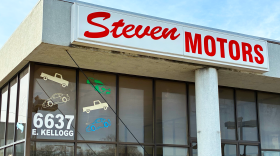In the westside neighborhood of North Lawndale in Chicago, neighbors gather outside chatting, listening to music, and just hanging out.
The neighborhood is also home to the Chicago Recovery Alliance, a group that provides services and paraphernalia to mitigate harm from substance use.
The group has been there for decades, and it serves other areas of Chicago with its mobile units, passing out syringes, naloxone, condoms, and other materials.
“People think that harm reduction is more controversial than it is,” said John Werning, executive director of the alliance. “It’s very effective at preventing transmission of disease and helping to save lives.”
The alliance hosts drop-in hours at its warehouse three times a week for people to pick up materials they need for themselves or others.

The alliance also uses silver vans to go into the community so even more people can pick up the same materials offered at the warehouse.
“The west and the south side are the two sides that we… see the highest rates of (overdoses), for very complicated reasons,” Werning said. “Mostly racism or just institutional racism, structuring of resources within the city.”
In Illinois, groups like the Chicago Recovery Alliance are able to pass out materials like syringes because of the state’s public health laws.
A policy signed in 2019 allows for needle and syringe exchange programs in the state to help prevent infectious diseases from using drugs.
The state also allows groups like the alliance to test drugs for fentanyl, xylazine and other substances. That’s not legal in Kansas and most other states.
While the group hands out materials, they’re also building community with people who use its services. That can also lead to people seeking treatment or other options.

“What I really need people to understand, especially folks who are in power and can change laws,” Werning said, “hyper-policing, it just doesn’t work.”
Few states have public health policies that address addiction and attempt to prevent disease.
In Kansas, the state legalized the use of fentanyl test strips just this year.
Groups like Safe Streets in Wichita say not having comprehensive public health policies makes it harder for community groups to prevent harm from substance use and overdose deaths.
“When we have science that backs up evidence, science that backs up approaches and strategies that not only mitigate harms caused by substance use, but also gets people on pathways to treatment and recovery, we should definitely be looking into that,” said Aonya Kendrick Barnett, executive director of Safe Streets.
Recent studies published in the International Journal of Drug Policy show that when strategies are used to mitigate harm during substance use, it can change people’s usage behaviors.
It also can benefit the wider community — as seen at the Chicago Recovery Alliance.
Michela, who asked that her last name not be used, says she’s been going to the alliance since 2012 and picks up items for herself and others.
“I have no wounds, no abscesses, no nothing. I mean, I’ve never caught any infections,” she said.
“With the Narcan stuff, I’ve actually lost count on how many people I’ve saved just the past year.”

In Wichita, Kendrick Barnett says Safe Streets is seeing the same thing when it passes out naloxone kits and fentanyl test strips.
“What's working is allowing the community to solve the community's problems. These are folks who are getting naloxone into places that I can't get into, you can't get into, but that need to be there.”
Advocates say giving people clean materials and paraphernalia they need to prevent disease from substance use can ultimately save communities and health care providers thousands or even millions of dollars a year.
But it’s hard to get people to look at it from a cost-saving perspective.
“The secondary portion of that is you are saving lives,” said Harold Casey, CEO of the Substance Abuse Center of Kansas. “How do you measure financially? How do you measure, without these services, 15, 20 more people would've had HIV, would've had AIDS, would've had tuberculosis?”
Werning, with the Chicago Recovery Alliance, says while public health policy is more progressive in Illinois, groups like his often have the same issue.
“So we can say, ‘Hey, we’ve saved the city $25 million over the years, but that’s not … positive dollars in there.”
Barnett says groups like Safe Streets and the alliance hope some money from recent and pending opioid settlement lawsuits could go to prevention efforts.
“We are owed these recovery dollars and these prevention dollars because we know how this will dismantle and impact a community. And we know what will work in terms of preventions.”
Ultimately, though, services like passing out naloxone and fentanyl test strips are saving lives, the groups say.
And for the people who use their services — they’re grateful.
“(If) they used that years ago, maybe a lot of people would be still alive if they’re gonna use drugs,” said Verge, who asked that his last name not be used.
“I wouldn’t trade it for nothing.”
Recovery from addiction is possible. For help, please call the free and confidential treatment referral hotline (1-800-662-HELP), or visit findtreatment.gov.








